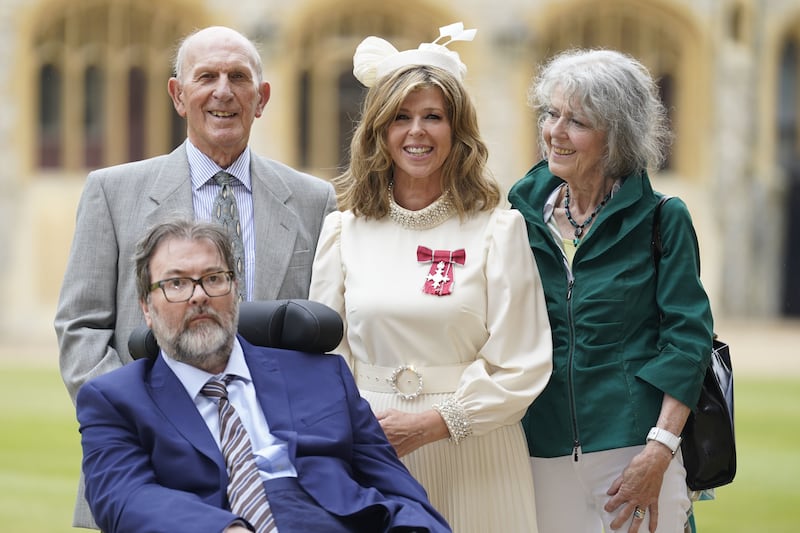Kate Garraway: Derek’s Story, ITV1, Tuesday at 9pm
Derek Draper was once described by former British prime minister Tony Blair as “someone you always wanted on your side”.
Regarded as “a tough, sometimes ruthless political operative”, he was a a political lobbyist who knew how to play the game.
But “underneath that tough exterior”, said Blair, he was a “loving, kind, generous and good natured man you wanted as a friend”.
And that soft side, that side of a man surrounded by the love of his family, is what is clear in a documentary that charts the poignant final year of Derek’s life.
Married to broadcaster Kate Garraway, Derek became one of the most severely affected Covid-19 patients in the UK.
Every organ in his body was attacked by the virus.
His uphill health battle was featured in two previous documentaries from the couple, but as the cameras rolled into their lives again, little did we know it would feature his death in January.
He was just 56.
- Kate Garraway says finishing Derek Draper documentary after his death was ‘hard’Opens in new window
- TV review: Masters of the Air finale is superb, even if Britain is written out of the warOpens in new window
- Kate Garraway says being called a widow ‘took her breath away’ on GMB returnOpens in new window
In the previous programmes, viewers saw Derek’s uphill health battle laid bare, but never once did he speak on camera.
But as this emotional one-hour documentary begins, he says: “I want to be heard”.
“Do you feel things are improving”, asks Kate, to which Derek immediately replies, “yes”... a pause of silence before adding: “why do you not?”.
Kate Garraway has said the £16,000 monthly cost of her husband Derek Draper's care caused her to rack up huge debts.
— Good Morning Britain (@GMB) March 26, 2024
The final year of Derek's life is documented in a new programme on @ITV tonight, in which Draper speaks on camera for the first time, saying: 'I want to be heard' pic.twitter.com/HISE2fWeaj
That realisation of the savage and cruel impact that Covid-19 had on his life is summed up by Derek himself at the start of the programme.
Writing a message in a notebook to encapsulate what had happened to his life, the former New Labour advisor wrote: “Covid changed everything”.
“My name is Derek Draper. I want you to hear my story”.

But it is the massive financial cost of caring for a loved one that becomes the main focus of the documentary and the incredibly broken care system that exists today.
Around one million people are cared for at home in the UK, but unlike the NHS, state-funded social care is only available to people with the highest needs and lowest means.
Despite Derek’s limited mobility and the need for specialist 24-hour care, he was not deemed “sick enough” and did not “have enough of a health need to qualify for funded care”.
Wife Kate describes how spiralling costs and bureaucratic obstacles to securing an adequate care plan plagued the last few years of his life.
She reveals she was paying almost £4,000 per week and estimates that, with the cost of rehabilitative therapies, the total bill was up to £800,000.
“Derek’s care costs more than my salary from TV,” she tells the documentary.
“And that’s before you pay for a mortgage, before you pay for any household bills, before you pay for anything for the kids.
“I’m not going to pretend, by the way, that I’m poorly paid. I have an incredible job that I love, which is well-paid.
“But it’s not enough.”
She tells of how “time and time again”, the system kept telling them Derek was not ill enough to qualify for help.
Thank you, @kategarraway, for yet again showing so powerfully the incredible challenges #UnpaidCarers are facing and why so many of them feel they have been ignored – financially and emotionally
— Carers Trust (@CarersTrust) March 27, 2024
Watch the documentary on @ITVX here: https://t.co/hmtvXEwqWi
Like many families, they relied on the help of extraordinary carers coming in and out of their homes as she tried to fight the system - one that is complicated and underfunded.
Kate was not playing the victim card, or asking for sympathy. Yes she gets paid well, but like so many others, she too struggled to cover the costs.
To me, she was simply a devoted wife trying to highlight the numerous obstacles and difficulties of a care system in major difficulty.
“Something has to be done, or the whole service, the people working in it, everything is going to break,” she said.
It’s a heart-breaking, emotional, yet inspiring documentary.
In granting access to their lives, the couple have thrown a large spotlight on the immense difficulties people living with long-term illness and their families face.
It is also devastating to see the impact of the broken care system that exists and that there appears to be no clear pathway out of it.








